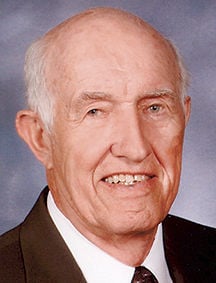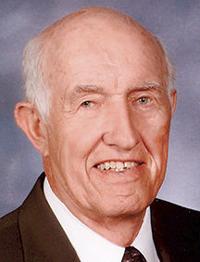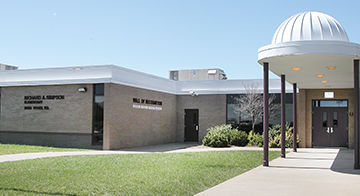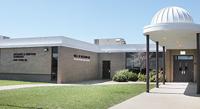Richard Simpson was the principal at Fox Junior High when young Jim Chellew entered the seventh grade there.
“I was so blessed when I went through Fox. Rich Simpson and his team were some of the best role models I could have had,” said Chellew, a retired Fox C-6 School District superintendent. “I wanted to be just like him – kind, caring, someone who worked really hard. There were so many of those guys – Mr. (Gerald) O'Connor, Mr. (Bud) Harbin, Mr. (James) Rickman – who pretty much took on his personality, relative to putting kids first.”
Mr. Simpson died Dec. 31 at age 85. He was an educator at Fox, serving in a number of roles, for more than 42 years.
He grew up in St. Louis and graduated from Cleveland High School, then Harris Teachers College before he began as a teacher at Fox. He had already moved into administration by the early 60s, when Fox was a small school district in a mostly rural area.
“The impact he had on this whole community was profound,” Chellew said. “He started when we had one school, and when he left, we had something like 16. He literally helped grow Fox from a tiny district to one of the largest in Missouri.”
One of Mr. Simpson’s strengths was his willingness to tailor his approach to fit students’ needs, individually and as a group.
“I did not have what you’d call a stellar career in elementary school,” Chellew said with a laugh. “He met with all the seventh-graders at the beginning of the year and I’ll never forget what he said.
“He said, ‘I don't really care how you did in elementary school. From my point of view, this is a chance for everyone to have a fresh start.’ It was the first time I’d ever heard the phrase, ‘Bury the hatchet.’
“It really impressed me, though. It’s funny how what teachers say can resonate with students. I thought, ‘This guy is talking to me!’ and it changed the trajectory of my school career.”
Chellew said Mr. Simpson was skilled at boosting students’ confidence.
“He was very student-centered. He called me in and encouraged me to join junior achievement. He had more confidence in me than I had in myself.
“And, to a kid, when someone of that stature sends you that kind of signal, it's a big deal.”
Mr. Simpson seemed to always keep the bigger picture in mind.
“It was never about him,” Chellew said. “He wasn’t building a resume, he was building a community. His success was about our success. He was there to make us successful – and trust me, that is not how all administrators are.”
Chellew recalls when Mr. Simpson went hunting for ways to keep ‘his’ kids entertained.
“My sister six years before me had him,” Chellew said. “Back then there wasn't much for kids to do; this area was mostly rural. He decided he was going to put together a Teen Town on Friday nights.”
Mr. Simpson set up a DJ and offered music and a place for kids to come and hang out.
“He even came up with a bunch of used roller skates from somewhere,” Chellew said with a laugh. “Every other week was roller night there in the gym. It was a big deal for the kids.”
Chellew had the opportunity to watch Mr. Simpson in action for a number of years, as their relationship transformed from student and teacher to co-workers and friends.
“When I went into Fox High School, he became principal there,” Chellew said. “When I came back from college and went to work at Fox, he was an assistant superintendent. I became a principal in 1984 and then went to the Central Office in 1989, so we worked together for several years.
“As a young administrator, one of my toughest things was just trying to keep up with him.”
That unflagging energy was one of the hallmarks of Mr. Simpson’s approach, along with his optimistic nature.
“He was one of the reasons I went into administration,” Chellew said. “He had a great sense of humor, and he was always happy and energetic, always optimistic about what we could accomplish. It was unbelievable the growth and progress we made in those years.”
Mr. Simpson served one year as Fox superintendent, while the search for a new district head was ongoing.
“When Diana Bourisaw was hired (in 1996), he stayed on as an assistant,” Chellew said. “Then he retired after her first year.”
Chellew said Mr. Simpson never seemed to get flustered by anything.
“I never saw him upset, as a student or an administrator,” he said. “He was very analytical about problems, very focused on how we could go about solving them. Oh, sure; if you monkeyed around, there were consequences. But those were never delivered with the idea of ‘I’m getting even,’ but rather that ‘I have to do this to make you a better person.’ That was Richard, all the way down the line.”
Chellew said he thinks of his friend each day when he passes Richard Simpson Elementary School.
“Rich’s contributions were significant to the extent that we can never pay it back,” he said. “It’s nice to pass there every day and be reminded of him.”
“Life Story,” posted Saturdays on Leader Publications’ website, focuses on one individual’s impact on his or her community.






